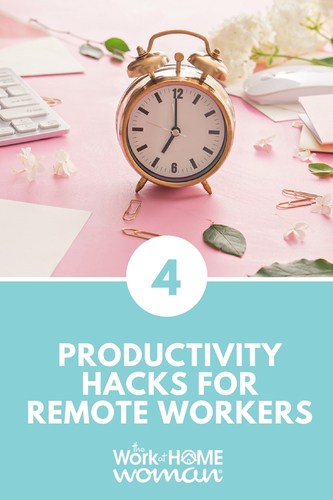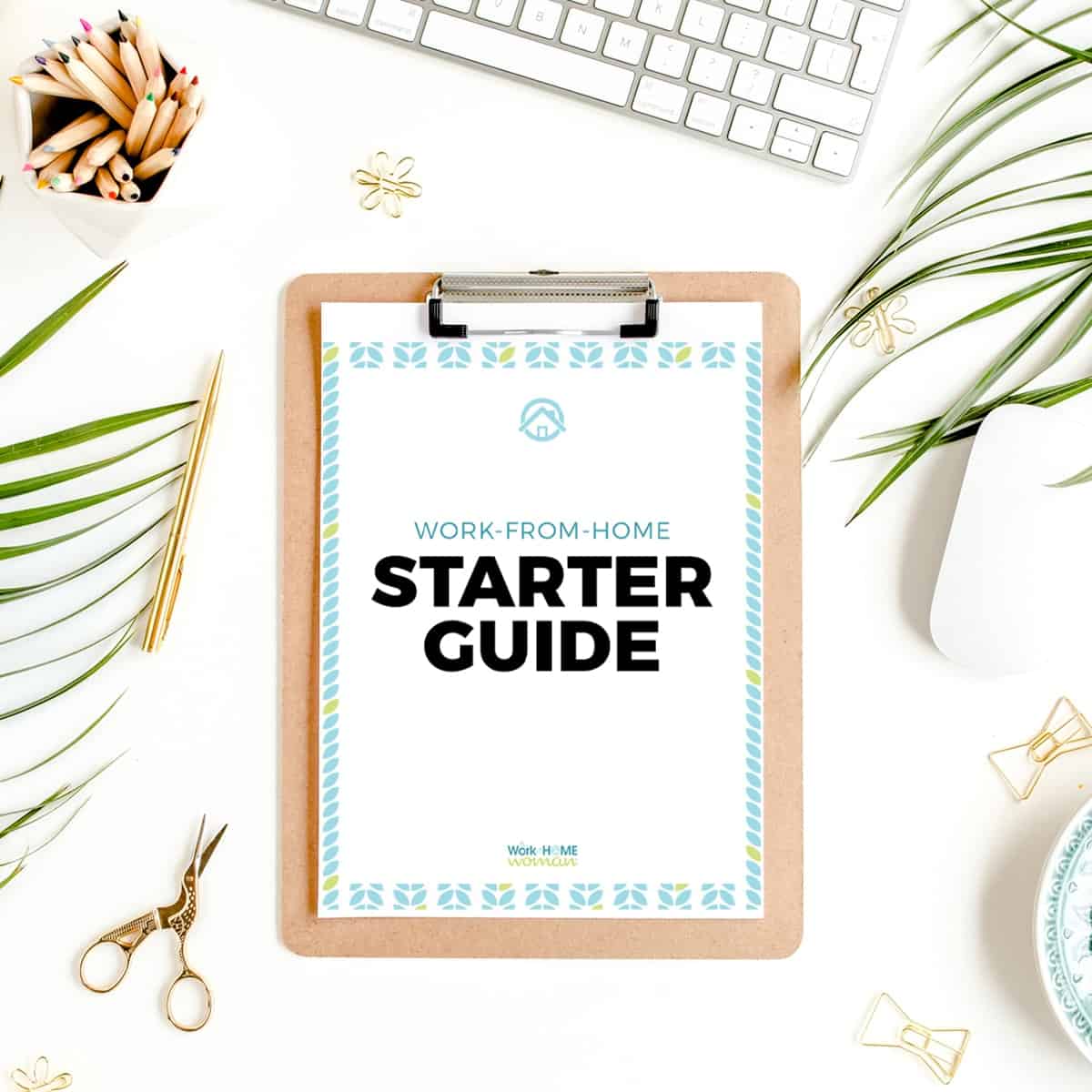 Though we are all blessed with the same 24 hours a day, most of us are interested in getting MORE out of our time. The premise of “work smarter, not harder” is an attractive one, but what are some concrete ways to be more productive as a work-at-home professional?
Though we are all blessed with the same 24 hours a day, most of us are interested in getting MORE out of our time. The premise of “work smarter, not harder” is an attractive one, but what are some concrete ways to be more productive as a work-at-home professional?
This question was on my mind as I tried to squeeze more out of my average workday, so I did some research and discovered some promising ideas, including the following four productivity hacks for remote workers:
1. Take care of your body and mind
Of course, this list would not be complete if we did not talk about the importance of taking care of yourself. Eating well (and regularly), working out, taking time for daily prayer or meditation, and getting proper rest are all going to have a direct impact on your ability to be productive. But there are a couple of easy things you can do that will give you an extra edge:
Drink a glass of water immediately upon waking
The Institute of Medicine recommends that we drink at least 10 cups of water per day. As I conducted my research, I learned that three-fourths of American’s are chronically dehydrated. And when you wake up after 8 hours or so, your body is definitely in a dehydrated state. So, one suggestion is to drink a big glass of water as soon as you get up. According to research, it can increase your metabolic rate by 30%, and make your brain work faster by 14%.
Take care of your eyes, stretch, and maintain sanity with a consistent “time out.”
I have had a role for over a decade that puts me in front of a computer screen 99% of my workday. As a result, my vision continues to decline year after year. One way to save your eyes is to mindfully look up from the screen and focus on something else further away. There have been countless articles outlining the dangers of being sedentary, too. So sitting in that chair for 9 hours straight is not helping. One solution that fixes both issues is to schedule frequent breaks (2-5 minutes) throughout your day. You can look up from your work and exercise your eyes, stretch your body and move around for a minute, and refill your water. An app like Time Out helps by providing you with reminders to take a break.
2. Eliminate distractions
It probably goes without saying that one of the primary things that slow us down are distractions. These may be self-induced (like taking a “break” to check Facebook and letting time get away from you), or somewhat out of our control (like the incessant barking from your neighbor’s dog). There are a few recommendations to help eliminate distractions and get in the zone:
Evaluate how you spend your time.
Maybe you are not really sure if you are losing precious time to needless distractions. If this is you, check out RescueTime. You simply set up an account, and it runs in the background of your computer and mobile devices and reports back to you the time you’ve spent on specific applications and websites. This data can help you to identify “time-sucks” you didn’t necessarily know you had, and as a result, you can make a game plan to eliminate them.
Reinforce your self-control.
Ok. Maybe you know full well what is distracting you and you can admit it. You stop to read an industry article and an hour later, end up knee-deep in news bites. Or, you far too frequently check your Twitter or Facebook feeds like an addict who is continually seeking a “fix.” If you want to help your resolve to stay off of these sites during your workday, consider tools like StayFocused. This chrome extension “helps you stay focused on work by restricting the amount of time you can spend on time-wasting websites.” Set what sites you need to avoid, and once you have met your time limit, you are forced to move on!
Block out environmental distractions and identify your productivity soundtrack.
Whether it is the sound of your neighbor’s barking dog; or, your nanny dealing with your crying, frustrated toddler; or you just need something to block out the deafening silence in your home office, there are tools you can use to boost your concentration. Take Focus@Will for example. They have developed a technology that uses your personality type to create music that they claim promotes brain activity that is more conducive to productivity. Even ambient noises like rain or a coffee shop can be effective in helping you to block out the distractions around you.
3. Organize your workload and test different methods
We all know there are hours when we are more productive and hours when we struggle with productivity. Experts advise instead of fighting this reality, you work with it. Try to schedule your tasks at certain times as much as possible. If you know you can buckle down and focus on detailed work in the morning, set aside time in the morning to complete that financial report. Or if you have trouble concentrating right after lunch, save some of the more mundane tasks, like filing or completing expense reports, for the early afternoon. Another way to get intentional about how you organize your work is to spend 15 minutes at the end of your workday each day to create your to-do list for the following day. You save precious time in the morning when you get in, and you can schedule those tasks you have to get done during an ideal time slot before your day starts to get hectic.
Do your work in batches or slices of time.
Productivity experts agree that multi-tasking is slowing us down. Some experts believe the answer is to batch tasks as much as possible during the week. So, for example, maybe you field internal planning meetings on Mondays; client meetings on Tuesdays; very detailed, focused work like reports on Wednesdays; etc. The idea is to develop a cadence to your work that will enable you to reduce multi-tasking and increase productivity. Another idea is to do your work in slices of time. One method that follows this idea is the Pomodoro Technique. The premise of this work method is to focus on one task at a time in 30-minute slots. You don’t answer your phone, email, or do anything else during that 30-minute slot other than the sole task at hand. Then, once your 30 minutes is up, you take a quick 5-minute break and move on to the next task.
Shorten the time you’ve allotted to do your work.
Ever have your boss move the deadline up significantly on a project you were working on, and somehow you managed to buckle down and get it done? Or, maybe you are normally someone who seems to get done in 4 hours what it takes your colleagues 8 hours to do. Well, the CEO of Tower Paddle Boards, Stephan Aarstol noticed this, too.
He implemented a 3-month test where he trimmed down the workday to just 5 hours and offered his employees a stake in their continued success with a profit-sharing program. The expectation was that even though they were cutting back to 5 hours, they still had to complete the same volume of work as they were doing the test.
The results were awesome, with the company achieving Inc. 5000’s list of America’s fastest-growing companies, almost $9 million in revenue, and a happier, more satisfied workforce. He even wrote a book about his experience if you are interested in the particulars. The lesson for us is this: if we give ourselves less time to do something, we don’t have the luxury of procrastinating or getting distracted. We HAVE to be focused and productive.
4. Block off time to evaluate your progress
Improving your productivity and effectiveness is not a “one and done” prospect. Book some time in your calendar at least once a month (maybe on a Monday morning or a Friday afternoon) to evaluate any changes you’ve made, if those changes are garnering the impact you were hoping for or if you should test a different method. It doesn’t hurt to take a second and evaluate your physical workspace, too. Maybe your productivity would increase if you cleared away some clutter in your office or invested in some new tools.
Conclusion
What changes have you made to improve your productivity? Are there effective tips and tricks you would recommend, or perhaps methods that definitely did NOT work for you? Drop us a note below. We’d love to hear what productivity hacks you have remote workers!









I’ve tested multiple productivity techniques and so far the one that works the best for me is the Kanban method. I like that it’s efficient despite its simplicity. It helps me to manage my tasks and projects and fight procrastination. If you want to read more about the method, here’s a ebook about it: https://www.slideshare.net/kanbantool/kanban-what-is-it
Hi Karina,
Thanks for sharing! I’ve never heard of the Kanban method, I’ll have to check it out.
Block scheduling has changed my life — I’m so much more productive since I started using this method.
I am a single mom with a MS and a kid about to go to college. Can you offer information about a home base job on translations/typing/counselor/office field.
These articles will give you a great place to start your WAH job search:
https://www.theworkathomewoman.com/jobs-for-people-with-chronic-illnesses/
https://www.theworkathomewoman.com/work-at-home-translator-jobs-and-opportunities/
https://www.theworkathomewoman.com/typing-jobs/
I am so glad that reading your article.love it.
Glad you enjoyed Christy’s article!